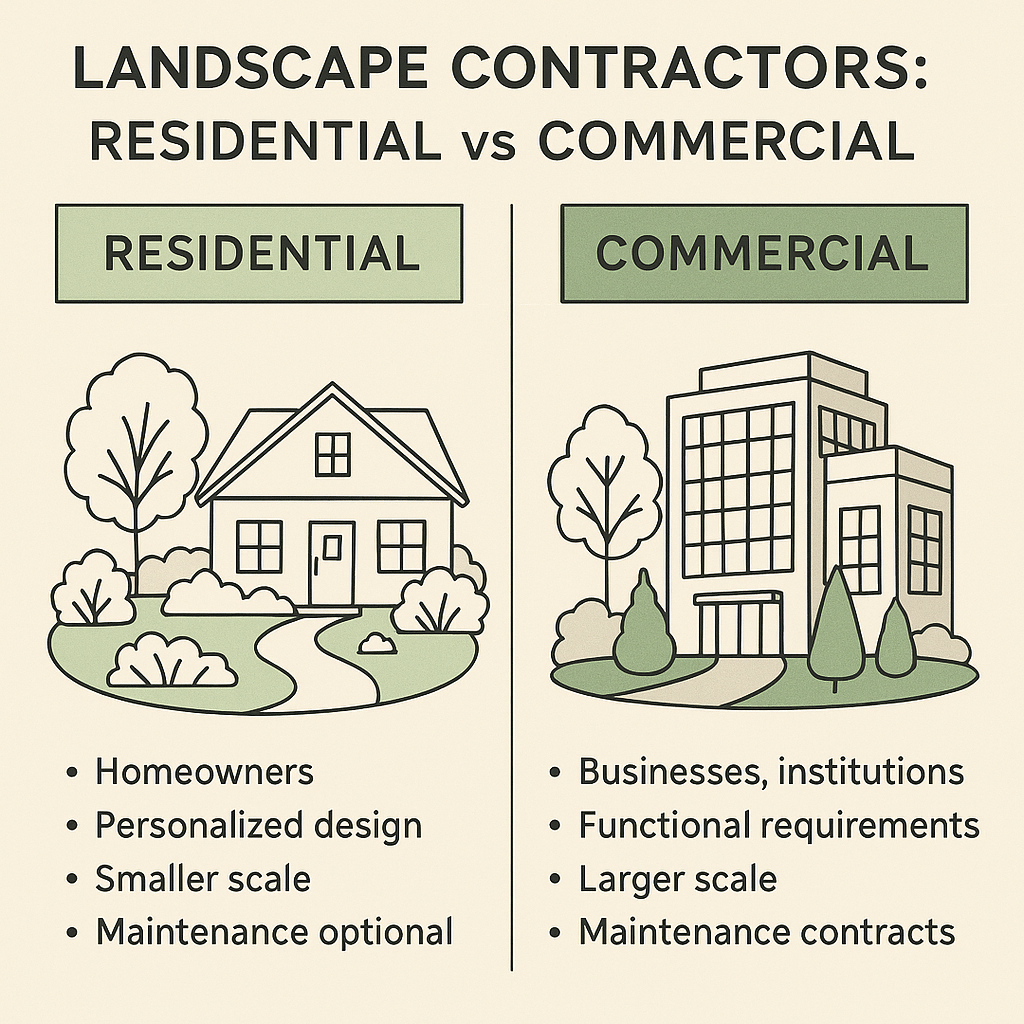When planning any outdoor project whether it’s a cozy backyard renovation or a sprawling business park hiring the right landscape contractor is crucial to ensuring long-term success. However, not all contractors are the same. Understanding the differences between residential and commercial landscape contractors can help you choose a provider that aligns with your vision, timeline, and budget.
This guide compares the scope, services, challenges, and expertise of residential versus commercial landscape contractor. Whether you’re a homeowner or a business owner, you’ll learn how each contractor type fits into the broader world of landscape design, landscape architecture, and landscape planning.
What Is a Landscape Contractor?
A landscape contractor is a licensed professional responsible for implementing and maintaining outdoor spaces. They transform landscape drawings and architectural concepts into real-life environments, managing everything from soil preparation and planting to hardscaping, irrigation, and lighting.
Their work supports:
- Landscape design ideas brought to life
- Long-term landscape maintenance and performance
- Aesthetic goals defined by clients or landscape architects
- Functional needs such as water management, access paths, and structural integrity
While both residential and commercial contractors perform similar core tasks, their roles differ significantly based on project scale and purpose.
Residential Landscape Contractors
Who They Serve:
Homeowners, private property managers, and small-scale residential developers.
Typical Projects:
- Backyard makeovers
- Garden landscaping
- Poolside or patio design
- Driveway and front-yard upgrades
- Fencing and privacy plantings
- Outdoor kitchens or entertainment areas
Services Offered:
- Custom landscape design for lifestyle preferences
- Softscaping (planting beds, turf, trees)
- Hardscaping (walkways, fire pits, stone walls)
- Irrigation system installation
- Landscape maintenance packages (mowing, trimming, seasonal planting)
Characteristics:
- Personalized attention and design customization
- Strong focus on aesthetics and family-friendly layouts
- Frequent collaboration with homeowners
- Shorter timelines and smaller budgets
- Emphasis on curb appeal, comfort, and usability
Residential landscape contractors often double as designers, offering end-to-end solutions. They are ideal for clients seeking a personal touch and close communication throughout the project.
Commercial Landscape Contractors
Who They Serve:
Corporate campuses, retail centers, municipalities, schools, hospitals, and industrial facilities.
Typical Projects:
- Office parks and business frontages
- Urban public parks
- Streetscapes and highway medians
- Multi-family residential developments
- Government building landscapes
- Schoolyard or campus landscaping
Services Offered:
- Implementation of large-scale landscape architecture plans
- Site grading, drainage, and environmental compliance
- Structural installations (retaining walls, accessibility ramps)
- Long-term landscape management contracts
- Snow removal and seasonal care in cold climates
Characteristics:
- Emphasis on durability, compliance, and long-term cost-efficiency
- Coordination with architects, engineers, and city planners
- Familiarity with permitting and regulatory processes
- Scalable equipment and skilled labor teams
- Work may span months or years
Commercial landscape contractors are often chosen through formal bidding processes and must adhere to strict codes and schedules.
Key Differences Between Residential and Commercial Landscape Contractors
| Criteria | Residential | Commercial |
|---|---|---|
| Client Type | Homeowners | Businesses, municipalities, institutions |
| Project Scope | Small to medium | Medium to very large |
| Customization Level | High (personalized) | Moderate (site standards, functional) |
| Design Collaboration | Direct with client/designer | With architects, engineers, planners |
| Code/Compliance Focus | Less intensive | High—must follow municipal regulations |
| Maintenance Contracts | Optional | Common and often long-term |
| Installation Speed | Faster turnaround | Phased or prolonged due to scale |
| Budget Range | Lower to moderate | Moderate to high |
When to Hire a Residential Landscape Contractor
Choose a residential contractor when:
- You’re redesigning your front or backyard
- You want a cozy, personalized outdoor environment
- Your project involves mainly softscaping and decorative elements
- You prefer regular involvement and design input
- You value a balance between visual appeal and day-to-day usability
Homeowners often benefit from personalized service, flexibility, and a contractor’s ability to offer creative landscaping styles suited to individual taste.
When to Hire a Commercial Landscape Contractor
Hire a commercial contractor when:
- You’re managing large-scale public or private projects
- Code compliance, accessibility, and safety are priorities
- Your project involves large budgets and timelines
- You need specialized equipment or large crews
- You require ongoing landscape management or maintenance plans
Commercial contractors are built for complexity, logistics, and delivering high-performance environments over time.
How Contractors Collaborate with Landscape Architects
Both residential and commercial contractors work closely with landscape architects to translate design intent into physical form.
Typical collaboration includes:
- Reviewing landscape drawings for feasibility
- Offering construction solutions for unique features
- Material sourcing and substitution suggestions
- Real-time site decisions during installation
- Communicating with stakeholders on updates or issues
In larger projects, the contractor also ensures that design landscape architecture goals are preserved while adhering to engineering standards.
Choosing the Right Contractor for Your Needs
Regardless of project size, finding the right professional starts with proper evaluation. Consider:
- Their previous work in projects like yours
- Licensing and insurance
- Knowledge of your regional climate and plant life
- Ability to offer maintenance post-installation
- Transparent contracts and timelines
If you’re not sure where to start, explore our full guide on how to Choose the Right Landscape Contractor for Your Project.
Final Thoughts
Whether your project is a suburban retreat or a large commercial space, selecting the right type of landscape contractor is key to success. Residential contractors shine when personalization and client interaction are top priorities. Commercial contractors, on the other hand, thrive in scale, complexity, and regulatory precision.
Each plays a critical role in advancing beautiful, functional outdoor spaces—grounded in the foundations of landscape architecture, executed through expert planning, and sustained by ongoing landscape maintenance.

